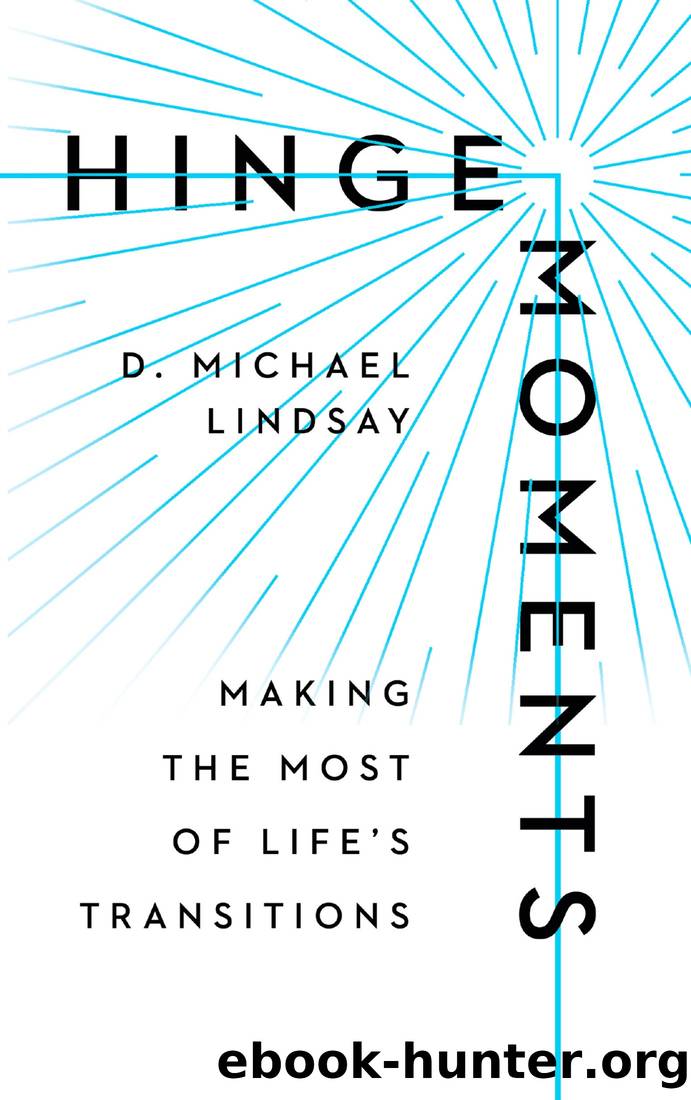Hinge Moments: Making the Most of Life's Transitions by D. Michael Lindsay

Author:D. Michael Lindsay [Lindsay, D. Michael]
Language: eng
Format: epub
Tags: Religion, Self-Help, Christian Living, Leadership, Personal Growth, Success, Leadership;Christian leadership;Gordon college;transition;life stage;vocation;Christian vocation;career;graduation;anxiety;pandemic;COVID-19;future;vision;goals;pivot;life plan;career change;vocation change;life transition;Platinum leadership;hinge moment;decision;make a change;change your life;success;Christian leader;leadership success;leadership stories;advice for leaders;decision making;god's will;god's plan for your life;leadership failure;important decision;life changing decision
ISBN: 9780830841790
Google: 1M8DEAAAQBAJ
Publisher: InterVarsity Press
Published: 2021-04-27T00:09:27.314523+00:00
Trust in Theory and Practice
Trustworthiness is a notoriously difficult virtue to nail down. Its scope ranges from the obviousâdoing what we said we were going to doâto the nebulous (but ever-present) social âstickinessâ that holds relationships and communities together. Itâs vaguely related to loyalty, but itâs more of a character trait than a choice. Although trust is a slippery concept to define, we recognize it when we see it, and when it is lacking we do not function optimally.
The most basic instinct all animals share is the drive to survive. Animals have developed different strategies to do this and in doing so have produced the variety of life we see today. For us âmoral, believing animals,â as sociologist Chris Smith puts it,2 otherwise known as humans, our competitive advantage is not wings, venom, or fangs, but cooperation. In fact, our ability to engage in symbolic communication (language) for the sake of cooperation is one of our most defining features as a species.3 This cooperation is the reason we can develop communities, and communities thrive on trust. In everyday life itâs easy for us to assess without thinking whether we trust someone or not, or whether we feel safe in a situation or not. So, although trust is difficult to define, evaluations of trustworthiness are second nature to us.
Furthermore, research suggests there is a complex but positively correlated relationship between levels of trust in a community and levels of health and wellbeing. A study of over twenty thousand Americans found that after controlling for income and education, individuals who lived in high-trust communities (where the respondents felt they could trust their neighbors) were more likely to report multiple indicators of health and wellbeing than were those who did not.4 However, this was only true for those people who were themselves highly trusted by others. This means that people in communities with high levels of social trust can benefit greatly but only if they themselves engender trust. So trust only works when it goes both ways. To want to be trusted by others and yet to trust no oneâor the other way aroundâis pathological.
Trust is even more powerful than many of us realize. In low-income communities, it can work against certain social forces that keep people impoverished. It was once thought that people remain poor because of some individual deficiency (such as laziness or stupidity). More recently we have come to understand that the dominant factors are systemic rather than personal. One of the chief contributing factors of cyclical poverty is what social scientists refer to as âpoverty-induced myopic decision-making.â In short, poverty affects people in such a way that they become less able to make decisions with long-term payoffs that would benefit them and more likely to make a worse decision that looks attractive in the short term (for instance, spending money on something they want now rather than saving for something better in the future, or taking a lower-paying job now rather than pursuing education for a higher-paying job later). Making the choice for a higher long-term payout requires trust in a system.
Download
This site does not store any files on its server. We only index and link to content provided by other sites. Please contact the content providers to delete copyright contents if any and email us, we'll remove relevant links or contents immediately.
Machine Learning at Scale with H2O by Gregory Keys | David Whiting(4284)
Never by Ken Follett(3924)
Fairy Tale by Stephen King(3360)
Reminders of Him: A Novel by Colleen Hoover(3066)
The Man Who Died Twice by Richard Osman(3057)
Will by Will Smith(2893)
Rationality by Steven Pinker(2345)
It Starts With Us (It Ends with Us #2) by Colleen Hoover(2320)
Can't Hurt Me: Master Your Mind and Defy the Odds - Clean Edition by David Goggins(2315)
Friends, Lovers, and the Big Terrible Thing by Matthew Perry(2209)
The Becoming by Nora Roberts(2180)
The Stranger in the Lifeboat by Mitch Albom(2107)
Love on the Brain by Ali Hazelwood(2048)
New Morning Mercies: A Daily Gospel Devotional by Paul David Tripp(1906)
The Strength In Our Scars by Bianca Sparacino(1833)
HBR's 10 Must Reads 2022 by Harvard Business Review(1830)
A Short History of War by Jeremy Black(1829)
A Game of Thrones (The Illustrated Edition) by George R. R. Martin(1700)
Never Finished: Unshackle Your Mind and Win the War Within by David Goggins(1693)
